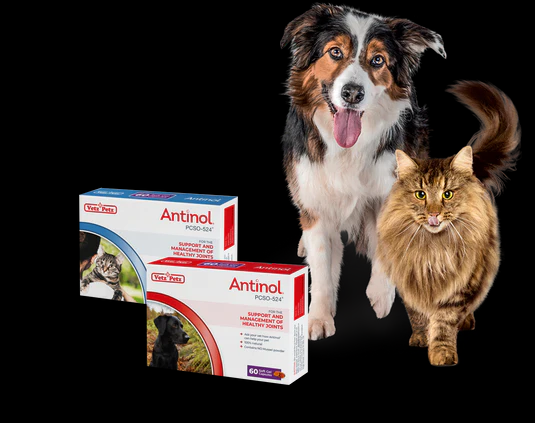Joint care for dogs
Joints are very important for dogs because they allow them to roam freely throughout the world. Joint pain, osteoarthritis, dysplasia, and osteochondrosis dissecans are some of the serious joint health issues that joint care for dogs seeks to prevent or reduce their veracity in the affected dogs.
Joint care for dogs is particularly important for dogs with arthritic joints because the pain could become unbearable for the dogs, and older dogs could lose their inhibition to play, go on walks, or even greet you at the door when you come back home from your daily routine.
Senior dogs frequently develop joint pain, arthritis, and bone deterioration as a result of their advanced age. This is because the cartilage suffers as a result of the synovium producing less lubricant.
Once the cartilage is damaged, repairing the associated joint could be difficult, which results in decreased mobility in senior dogs. That is why every dog owner should not underestimate the importance of joint support for dogs.
When do you commence joint care for your dog?
As soon as you bring your new puppy home, you should put joint care a top priority for the puppy. That helps in the prevention of certain disorders, such as arthritis and joint pain in dogs, as well as the slowing of their advancement.
If your dog develops joint issues as shown by the following signs and symptoms, you may need to step up joint care for your dog:
- Limping or flinching to move on one side to keep their weight off the affected joints.
- Standing on only the front legs, which signifies hip dysplasia, is the most common form of arthritis in senior dogs. Dogs with hip dysplasia tend to stand only on their front legs to avoid putting pressure on their hind legs and hips.
- Refusal to jump or scale up the stairs due to how stressful it is on the joints. You’ll need to extend joint care for dogs that refuse to do activities that they gleefully used to do, regardless of whether they are of advanced age or not.
- Swollen joints, which are normally caused by inflammation from joint pain. Early detection and action could prevent further damage to the joint.
- Muscle degeneration around the affected joints.
- Licking the affected joints in an attempt to relieve some of the pain.
- Changes in the dogs’ temperament and irritability.
- Depression or lethargic behaviour.
Extending joint care for dogs
There are many suggestions to assist dogs' joints sustain themselves better. Some of them include releasing tension that builds up near the joints of the dogs. The techniques focus on the muscle groups near the joints to increase flexibility and help the dogs carry more weight. The ideal option for increased joint support for dogs is a combination of the two.
You can target the tension and pressure on the dogs' joints as part of joint support for dogs by carrying out the following actions:
- Helping the dogs to keep a lean figure
Helping dogs keep a lean figure is crucial because being overweight and obese may put the most strain on the joints. Because the additional weight is not supported by additional cartilage or synovial fluid, the bones are compressed closer together, which increases friction.
A nutritious food and maintaining a healthy weight for your dog can undoubtedly relieve some of the stress on its joints.
- Improving the dogs’ diet
A healthy gut biome develops in dogs when their food is balanced. Everything, from the dog's mood to heart and bone health, improved as a result of having a healthy intestinal biome.
Combining healthy ingredients with the best joint supplements for dogs is a great way to improve your dog’s quality of life and keep its joints strong and healthy.
- Low impact activities
Running, jumping, and catching are high-impact exercises that might destabilise a dog's joints. They might potentially cause your dog considerable harm. Instead, include low-impact activities like walking and swimming to your dog's joint care regimen because they keep dogs engaged and secure.

- Indoor games
Outdoor games can entail strenuous workouts. Try switching to indoor games like teaching your dog to find toys using their keen sense of smell, hide and seek, etc. to avoid them as you prolong joint care for your dog.
- Helping your dog to stretch
Try to encourage your dog to engage in some stretching activities when they are relaxed and lying down. Professionals at Antinol can advise you on the stretches that are best for aching joints.
- Strengthening exercises
Although you cannot directly train a dog's joints, you can strengthen the muscles that surround the joints. This will enable the joint itself to absorb part of the stress experienced in the joints.
- Joint supplement for dogs
Joint supplements for dogs do not only focus on lubrication because they are unable to help the body produce new cartilage. It is essential for dog owners to provide their dogs with the best dog joint supplements with the ability to help the growth of new joint tissue. Such joint supplements can also offer the ingredients needed to prevent joint damage in the first place.
Joint supplements such as the Antinol dog supplement are great for preventive measures, halting any continuing damage, and aiding in the repair of damaged joints by laying down new cartilage.
Get more information and help with joint care for dogs
If you need information and help with joint support for dogs, the best joint supplements for dogs, and how to extend joint care for dogs, reach out by clicking here to get the assistance you need.





Comments